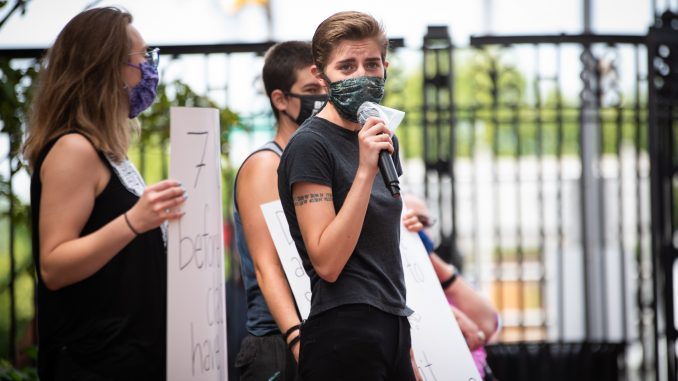
For many students, the summer is a time to unwind from the semester, catch up on sleep and hang out with friends. But for some, this summer has been filled with planning, organizing and protesting.
Several student-led groups at Temple University have organized and led protests on Main Campus throughout the summer. For these groups, the fight against racial injustice on campus is viewed as a necessary duty.
Groups include Temple University Coalition for Change, a newly-formed organization with the goal of reforming Temple and holding the university accountable for what they argue are contributions to systemic racism, according to a post made on the coalition’s Instagram account.
On July 8, the group held an anti-racist protest with other advocacy groups including Stadium Stompers and the Black and Brown Coalition.
Teresa Swartley, a senior political science major and co-founder of the coalition, said the group organizes to give a platform for underrepresented students, faculty, alumni, staff and community members to speak out against Temple’s administrative policies.
Swartley said the coalition was created in June as a response to nationwide protests following the death of George Floyd, a Black man, who died after Derek Chauvin, a Minneapolis police officer, knelt on Floyd’s neck for multiple minutes, according to a CNN report.
“We need to turn the fight inward and reflect upon how our affiliations contributed towards these sorts of injustices,” Swartley said.
Other student groups shifted their attention toward ongoing movements to enact change on campus.
Taylor Sanders, a senior art history major, has utilized her group, Women of Color Creatives, to both amplify the voices of women of color on campus and show support and solidarity for other groups advocating for change.
“As the Black Lives Matter movement protests were happening, I felt it was called for our org to be more involved with the movement and to align with their mission,” Sanders said.
After transferring to Temple a year and a half ago, Sanders founded the group, intending to give women of color a space on campus to talk about their experiences and to provide them with a creative outlet to express themselves.
“I felt like being a Black woman, it was important to create our own space because at times I personally felt there wasn’t a lot of room for me or my identity and I wanted to create a space for people,” Sanders said.
The group decided to join ranks with Defund TUPD, a student-led organization that wants Temple Police to be defunded and removed from Temple’s campus and in the surrounding North Philly area. The two groups created a list of demands that include terminating all funding and donations to the Philadelphia Police Foundation and reallocating money to increase funding for the Africology and African American studies and gender, sexuality and women’s studies departments.
“After hearing that Temple was funding the police, I felt passionate about our tuition money not going towards a system or structure that goes against our student body,” Sanders said.
In June, Temple announced it would stop funding the Philadelphia Police Foundation and would reallocate those funds into social justice programs after receiving concerns from students and community members about the university’s donations to the foundation.
Carol Jean Gallo, an intellectual heritage instructor, became involved with Defund TUPD through being a member of the Rank-and-File Caucus and Temple Coalition for Change.
“For me, it has been great to be able to support students in ways I don’t always get to as a teacher,” Gallo said.
Jason Del Gandio, an assistant professor of communication and social influence, suggests students learn the dynamics of protests and social movements to have an effective protest.
“Now is the time for radical social change,” said Del Gandio.
As the fall semester kicks off, neither group has the intention to slow down their work but plans to remain politically active during the semester.
Swartley wants to remind student activists to take care of themselves as they plan for their next protest.
“It’s impossible to help everyone all the time,” Swartley said. “We at TUCFC care so much but we recognize the importance of self-care and encourage each other constantly to take a break.”
Correction: An earlier version of this story misspelled Jason Del Gandio’s last name.



Be the first to comment